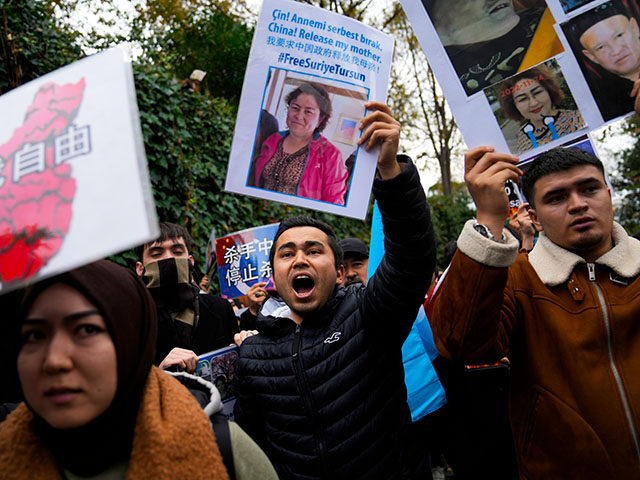Sens. Marco Rubio (R-FL) and Jeff Merkley (D-OR) introduced a bill on Thursday that would require the Department of the Treasury to use America’s representatives at international institutions to pressure those entities not to fund slavery around the world, especially Chinese government’s genocidal Uyghur slavery practices.
The “No Funds for Forced Labor Act” specifically addresses the mass internment of millions of ethnic Uyghur people in occupied East Turkistan – the region communist China has rebranded the “Xinjiang Uyghur Autonomous Region” (XUAR) – in concentration camps, where they have endured a litany of barbarities including enslavement. Some estimates suggest China has imprisoned as many as 3 million people from East Turkistan in concentration camps.
Facing growing international scrutiny, the Chinese Communist Party began claiming in 2019 that the concentration camps, which it refers to as “vocational and educational training” facilities, had “graduated” most of its students. A year later, the Australian Strategic Policy Institute (ASPI) published the landmark report Uyghurs for Sale detailing how China was bussing Uyghur slaves out of the camps and selling them to factories around the country, allowing Beijing to claim the camps were shutting down while still exploiting Uyghur slavery – and protecting its supply chains from foreigners attempting to find evidence of human rights abuses.
Forced labor – a form of “21st century slavery,” according to most international legal scholars – remains pervasive in China, and particularly affects the indigenous people of East Turkistan.
The No Funds for Forced Labor Act, if passed, would empower the U.S. government to combat funding for operations that benefit from slavery, particularly in China. The bill’s text as it stands at press time demands that the Secretary of the Treasury “instruct the United States Executive Directors at the international financial institutions to advocate opposition to projects that make use of forced labor.”
“In 2022, the Atlantic Council published a report detailing that the World Bank’s private lending body, the International Finance Corporation,” the bill notes, “determined that several clients of the Corporation were active participants in the People’s Republic of China campaign against the Uyghur people and Uyghur culture in the Xinjiang Uyghur Autonomous Region.”
American representatives as such institutions would be legally obligated to oppose the funding of projects to “be carried out by a state-owned or heavily state-influenced entity in the Xinjiang Uyghur Autonomous Region of the People’s Republic of China” due to the pervasiveness of slavery in the region. The requirement to oppose slave-tainted projects, or those at high risk of benefitting from forced labor, is not limited to China, however, but any such project around the world.
The bill would also demand that the relevant representatives “provide an explanation of how they vet projects for forced labor risks and what actions are taken to mitigate, track, and reverse that risk,” according to a press release published by Sens. Rubio and Merkley.
The Treasury would also have to provide an annual report for at least the next five years on any projects that the institutions in question approve despite American opposition that present a risk of slavery.
“Forced labor is a horrific practice witnessed worldwide. In China, the Chinese Communist Party continues with its grotesque campaign of genocide against Uyghurs and other minorities,” Sen. Rubio said in a statement on Thursday. “We have a moral duty to ensure our nation isn’t tied to any purchases tainted with the forced labor of humans.”
Sen. Merkley affirmed, “Our tax dollars should never inadvertently go toward projects using forced labor… We need to send a strong message against slave labor wherever this evil appears.”
The bill would build upon a growing volume of legislation to oppose the ongoing genocide of Uyghurs, Kazakhs, Kyrgyz people, and other non-Han ethnic groups in East Turkistan, most prominently represented by the Uyghur Forced Labor Prevention Act (UFLPA). The UFLPA, which came into effect in 2022, bans imports into the United States of goods coming from East Turkistan unless the importer can offer proof that the products in question were not tainted with slave labor.
The rebuttable presumption of slavery the law created was a significant advance in addressing the genocide in East Turkistan, but Chinese companies have since found a massive loophole to UFLPA scrutiny: the de minimis exception, which allows American authorities to exempt shipments worth less than $800 from inspection to ensure they comply with the law. The de minimis exception also allows those shipments to avoid millions of dollars in duties and other import fees.
“Chinese companies like Temu and Shein exploit a loophole in U.S. law to avoid tariffs and accountability for their ties to slave labor,” Sen. Rubio, who introduced the UFLPA, told Breitbart News in February. Shein and Temu are “fast fashion” companies that sell highly discounted, low-quality clothing; Temu also sells a variety of products including art supplies and household goods.
Sen. Rubio has introduced other legislation, the Import Security and Fairness Act, to close the de minimis loophole, along with Sen. Sherrod Brown (D-OH). It has yet to progress to a vote in Congress; Democrats are instead asking President Joe Biden to act via executive order to close the loophole, but he has yet to do so.

COMMENTS
Please let us know if you're having issues with commenting.